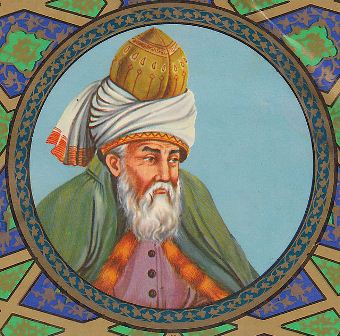Arts and Literature, Learning
Introduction to Mystical Poems of Rumi

Jalāl ad-Dīn Muhammad Rumi was born on September 30, 1207 to Persian speaking parents in what is present day Afghanistan. He is known also as Mevlana or Mawlānā (Our Master), Mevlevi or Mawlawī ( My Master). He was a 13th-century Persian poet, jurist, theologian, and Sufi mystic.
Rumi wrote mostly in Persian and few using the the Cappadocian Greek vernacular have been preserved to this day. His poetry has influenced Persian literature as well as Turkish, Punjabi, Urdu, Pashto, Ottoman Turkish, Chagatai and Sindhi. His poems have been widely translated into many of the world’s languages and presented into various formats. Coleman Barks is one of his works’ translators.
Mathnawi, a poetic collection remains one of the purest literary glories of Persia and one of the crowning glories of the Persian language. For the past 7 centuries, people all over the world, regardless of their nationality, creed and spirituality have looked up to Rumi’s works because of their universal meaning and messages. The spirituality embedded in his literary pieces serve as guide over the passage of time.
Rumi died on 17 December 1273 but his legacy of spiritual meaning through his poems lives on.
Social media in Kuwait http://kabayaninkuwait.com/ gives the latest job openings in Kuwait.
(photo credit to Wikipedia)
MUST-READ AND SHARE!
Year 2020: A Gratitude Note
The Covid-19 Guidebook Second Edition has Finally Launched!
Ang Natatanging Aklat ni Bebang
Thank You, Sir Ricky Laxa
Hopeful Project: Free Books about Blogging

A multi-award-winning blogger and advocate for OFWs and investment literacy; recipient of the Mass Media Advocacy Award, Philippine Expat Blog Award, and Most Outstanding Balikbayan Award. Her first book, The Global Filipino Bloggers OFW Edition, was launched at the Philippine Embassy in Kuwait. A certified Registered Financial Planner of the Philippines specializing in the Stock Market. A recognized author of the National Book Development Board of the Philippines. Co-founder of Teachers Specialist Organization in Kuwait (TSOK) and Filipino Bloggers in Kuwait (FBK). An international member of writing and poetry. Published more than 10 books. Read more: About DiaryNiGracia
Acknowledgements
DISCLAIMER



Peace and love to you.